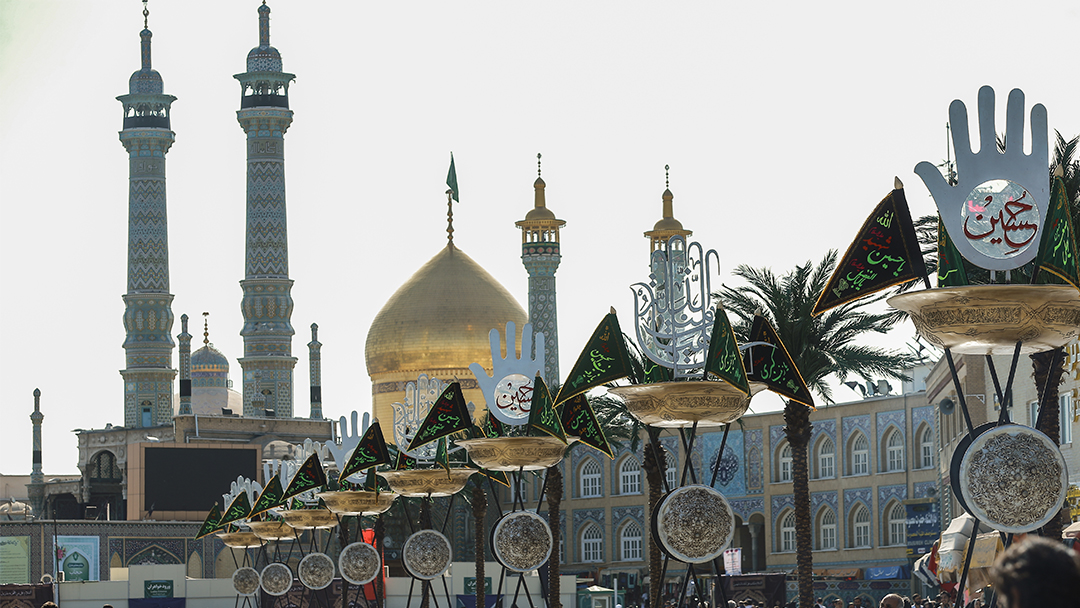Husayn (peace be on him) is the third Imam of the Shiites, the son of Ali b. Abi Taleb (peace be on him) (the first Imam of the Shiites) and Lady Fatima al-Zahra (the daughter of the Holy Prophet peace be on him and his household). He was born on the 3rd of Shaban in the year 4 AH (626 CE) and was martyred on the 10th of Muharram, 61 AH (680 CE).
He was martyred on the day of Ashura (10th of Muharram) on the plains of Karbala and in a battle with the army of Yazid (the son of Muawiyah and the ruler of the Islamic nation).
Due to his honorable spirit and since he was anti-oppressors, Husayn (peace be on him) did not accept Muawiya’s (the then caliph) request regarding the heir apparency of his son Yazid because he was an incompetent, corrupt, and immoral person.
After the death of Muawiya in 60 AH (October 680), Yazid enticed the cowardly and weak-hearted people of Kufa and they supported and paid allegiance to him, and prepared for battle with Imam Husayn (peace be on him), the grandson of the Holy Prophet (peace be on him and his household) at his command. And it was at that time that Imam Husayn (peace be on him) was on his way to Kufa with his family at the invitation and request of the people of Kufa; however, he encountered the disloyalty of the people of Kufa.
Of the prominent attributes of Imam Husayn (peace be on him) which are the Prophet (peace be on him and his household)’s legacy to him, were the beautiful attribute of bravery and resistance. A person is braver in society to the extent that he is stronger and more powerful against his internal desires. According to God’s words in the Quran and historical sources, the Holy Prophet (peace be on him and his household) possessed unparalleled bravery and was the bravest and strongest of heart in fighting against the enemies of Islam and Imam Husayn (peace be on him) had also inherited his unexampled bravery from his father, Imam Ali and his grandfather (peace be on them).
A prominent example of the bravery of Imam Husayn (peace be on him) and his companions in the battle between him and Yazid can be explained as follows: while the enemy had blocked water from Husayn (peace be on him), his children, and his companions, and the cries of thirst of the children could be heard; however, the companions of Imam Husayn (peace be on him) bravely fought the enemy and did not accept disgrace even at the cost of the lives of their loved ones in fighting against Yazid, and did not surrender to the enemy. So strong-hearted and powerful was he in battle, in these same difficult conditions, that the world has never witnessed such a warrior.
The conduct and method of the Ahlulbayt (peace be on them) and Imam Husayn (peace be on him) was such that the Prophet and his progeny never started a war. Even on the Day of Ashura, Imam Husayn (peace be on him) was not the instigator of the battle; however, when the battle started, the Imam and his companions stood tall and did not surrender.
The bravery and courage of Imam Husayn (peace be on him) was not limited to the Day of Ashura. He was unparalleled in his bravery and courage in his childhood and youth because he passed the first seven years of his life with his grandfather, Muhammad, the Prophet of God (peace be on him and his household). According to historical reports, Prophet Muhammad (peace be on him and his household) held intense love for Husayn and his brother Hasan al-Mujtaba (peace be on them). In one of his narrations, the Holy Prophet states: Hasan and Husayn are the Leaders and Chiefs of the youth of Paradise.
In general, the words and methods of Imam Husayn (peace be on him) are honorable. Only one of the dimensions of Imam Husayn’s uprising and resistance is that he was oppressed; however, the other aspect is dignity and an epic.
The words of Imam Husayn (peace be on him) show his bravery and dignity, that is, from the time that Imam Husayn is asked to pay allegiance to Yazid (the unworthy and corrupt son of Muawiya), he speaks with dignity and says in that same gathering: Islam must be bid farewell to when Islam becomes afflicted with an undeserving and corrupt ruler such as Yazid. At that very place, he completely rejects Yazid. This way of taking a position is a position of honor and dignity.
Imam Husayn (peace be on him)’s policy was such that he would state:
Death is more worthy and admirable than that I surrender to disgrace and similarly, enduring not surrendering to the wishes of the enemy is better than entering the fire of hell and the fire of God’s wrath.
Imam Husayn (peace be on him)’s resistance and not agreeing to surrender to the enemy is an abiding lesson for liberal thinkers such as Gandhi and Nelson Mandela in contemporary centuries as well.
One of Gandhi’s statements is as follows: If India wishes to be victorious; it must follow the policy of Imam Husayn (peace be on him).
If we consider Gandhi’s praise and Nelson Mandela’s understanding of Imam Husayn (peace be on him), we will see that if both and thousands of others who have, at different occasions, introduced themselves as students of Imam Husayn ([eace be on him) did not know him, would they have achieved their goals?
Sources:
• Speech on the 7th anniversary of the death of Imam Khomeini
• Mathir al-Ahzan, Ibn Nama Hilli
• Ithbat al-Wasiyya, Ali b. Husayn Masoudi
• Amali, Shaykh al-Saduq
• Luhuf, Sayyid Ibn Tawus
translator: Rashed


